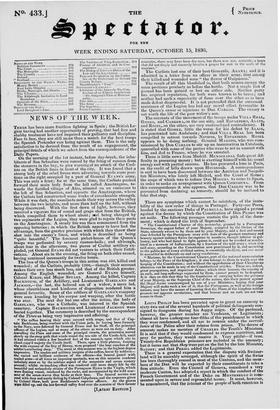There are symptoms which cannot be mistaken, of the insta-
bility of the new order of things in Portugal. Forty-one Peers, headed by the cautious Duke of PALMELLA, have signed a protest against the decree by which the Constitution of Don PEDRO was set aside. The following passages contain the pith of the docu- ment; which is dated the 18th of September. " The Constitutional Charter of this monarchy, granted by a Portuguese Sovereign, the august father of your Majesty, accepted by the Orders of the State, solemnly sworn to by them and by your Majesty, and a first and second time defended by the Portuguese army with feats of the greatest constancy and bravery against military forces far superior in numbers, though inferior in gal- lantry, and who had dared to fight against it, could not be revoked or annihi- lated in a momeot of hallucination, by a fraction of the said army; when this said army, according to the Constitution now proclaimed by it, and according to the public law of every civilized nation, is essentially obedient, and can 71CCer be assembled to deliberate on and carry resolutions. " Madame, by the Constitutional Charter, part of the national representation belongs to the Peers of the kingdom ; it also belongs to them to watch over the keeping of the Constitution ; and without the approbation of their Chamber no alteration can be made in any of the Constitutional articles. These are, indeed, great prerogatives, and important duties ; which their honour, the sanctity of an oath, and long sufferings supported by them, cannot permit to be despised. It is then on this that they lay the foundation of carrying before the presence of your Majesty, as the Supreme Chief of the nation, this their protest against the illegal decree countersigned by one of your Ministers; hoping that your Majesty will make such a use of it, that the Portuguese, as well as the foreign nations, may have the means of knowing that the Peers of the kingdom neither promote nor approve revolutions, and that honour and an oath are not vain names to them."


























